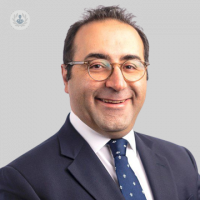What are the symptoms of a skull base meningioma?
Written by:Skull base meningiomas are a type of brain tumour. Although generally non-cancerous, treatment is required to prevent skull base meningiomas from growing bigger and affecting important parts of the brain.
Here, Mr Alireza Shoakazemi, renowned consultant neurosurgeon based in London, provides an expert insight into skull base meningiomas, including symptoms and treatment.

What is a skull base meningioma?
Meningiomas are usually benign and slow-growing tumours that arise from the meninges, which are essentially the cover of the brain. When meningiomas arise from the base of the skull, they are called skull base meningiomas.
Skull base meningiomas have different rates of growth and can arise from different parts of the base of the skull.
What are the symptoms of a skull base meningioma? Do they cause pain?
This really depends on the location and the growth rate of the skull base meningioma. Many skull base meningiomas remain asymptomatic for quite a long time.
Symptoms could be caused as a result of pressure on the adjacent brain tissue or, sometimes, due to the growth of the tumour around the cranial nerves, which can potentially affect the function of these nerves. As a result, patients might experience blurred vision, hearing problems or other symptoms that are caused by the pressure on the cranial nerves.
In many cases, skull base meningiomas are found incidentally, when patients are undergoing investigations for other issues.
What causes a skull base meningioma?
Very rarely, skull base meningiomas can develop as a result of previous radiotherapy or genetic conditions.
In the majority of cases, the cause of skull base meningiomas is unknown.
How are skull base meningiomas treated?
In general, there are three main treatment options available when a patient is diagnosed with a skull base meningioma.
The first option, if the tumour is small and is not causing symptoms, involves active monitoring via periodic MRI scans. In the future, follow up of the tumour would be carried out with further MRI scans, as well.
The second option involves surgery. Many skull base meningiomas, particularly those that are located around the optic nerve or around important neurovascular structures, will require complex skull base surgery or, in some cases, tumour debulking surgery to remove the bulk (as much as possible) of the tumour. If the tumour is not completely removed, the residual tumour is closely followed up with MRI scans in the future.
The third option involves radiotherapy. This could be in the form of stereotactic radiosurgery, which is classified as Gamma Knife radiosurgery or CyberKnife radiosurgery. Sometimes, other modalities will offer radiotherapies as well for the treatment of skull base meningiomas or any residual tumour left after surgery.
What is the survival rate for skull base meningiomas?
This really depends on the size and the location of the skull base meningioma. Nowadays, the molecular profile of each tumour is checked separately as well, and this can be predictive of future growth in these meningiomas.
Very rarely, skull base meningiomas are classified as Grade 2 or Grade 3, which are more aggressive tumours.
However, in general, survival rate depends on the size of the skull base meningioma, the diagnosis, the type of treatment, and the grading of the skull base meningioma.
Mr Alireza Shoakazemi is a renowned consultant neurosurgeon with more than a decade of clinical experience.
If you are concerned about the presence of a skull base meningioma and would like to seek expert monitoring and treatment for it, do not hesitate to visit Mr Shoakazemi’s Top Doctors profile today.


